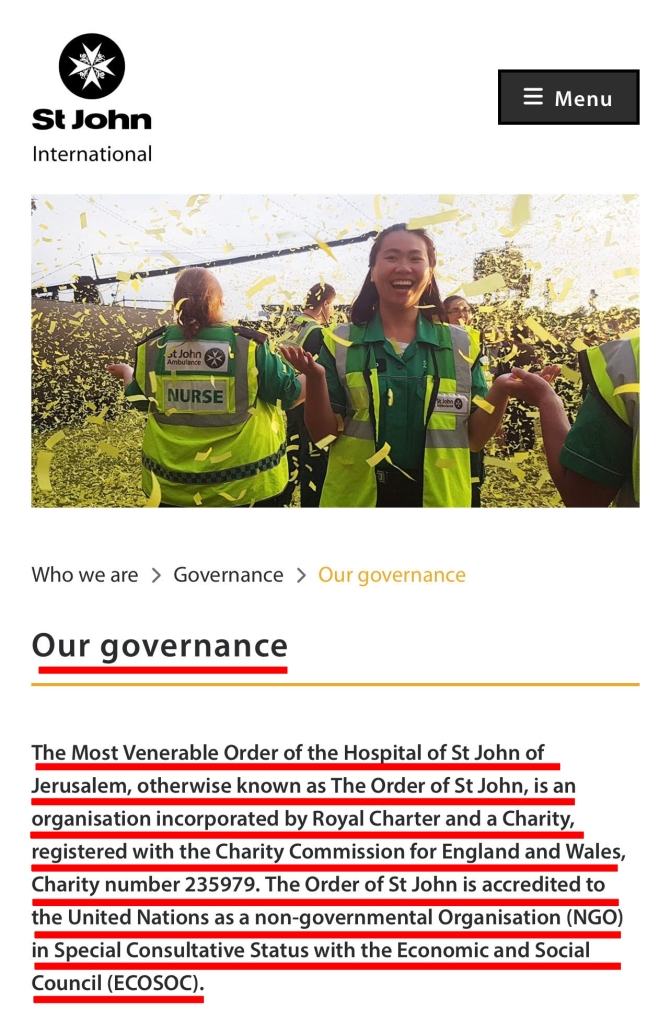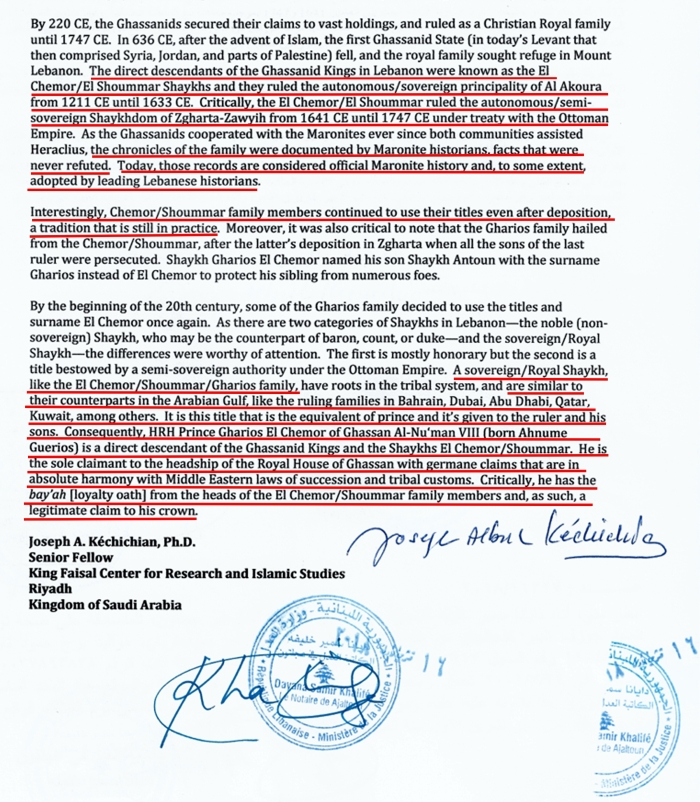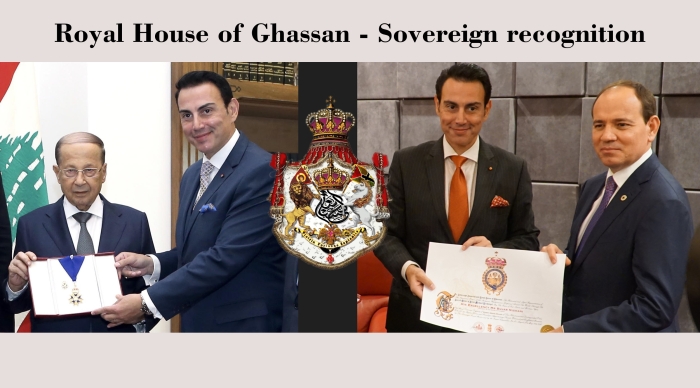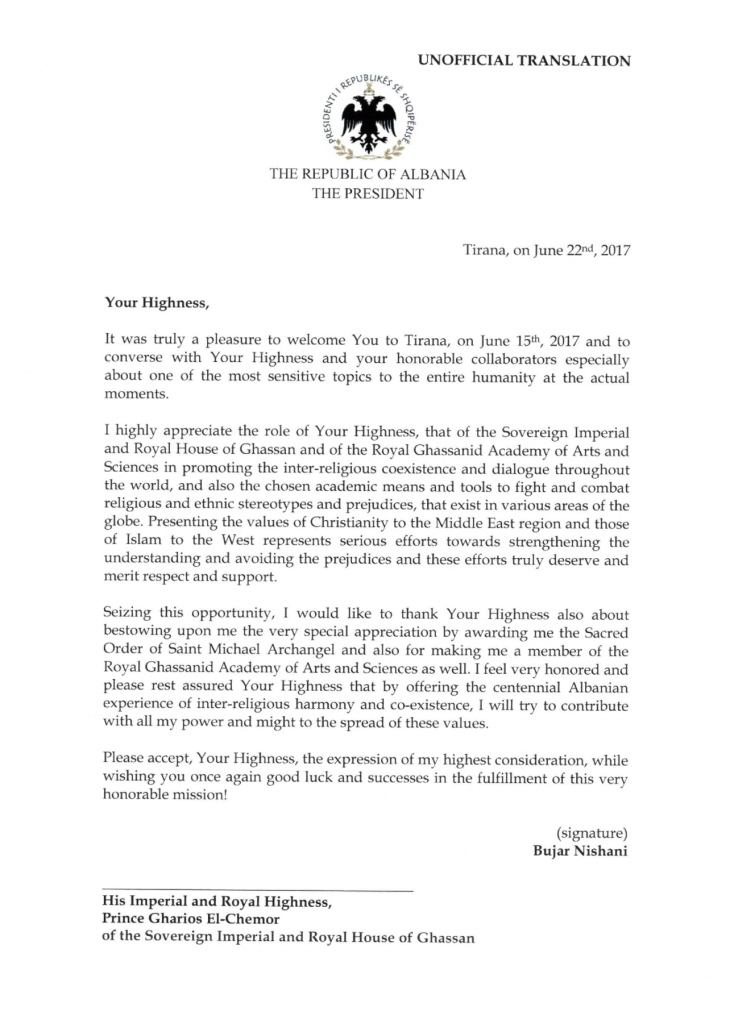The Royal House of Ghassan enjoys the exact same legal recognition as The British Order of Saint John (under HM King Charles III) and the Spanish Orders given by HM King Felipe VI, being registered as a non-profit organization domestically with accreditation by the head of State and also the United Nations.

The history of the El Chemor/Gharios/Guerios family is part of the official Lebanese and Maronite history, and it’s present in books and encyclopedias confirming that the family has ruled two small principalities in today’s Lebanon for around 500 years being the direct descendant of the Ghassanid Kings.
But what was the recognition of the head of the Royal House HIRH Prince Gharios El Chemor of Ghassan Al-Numan VIII (nee. Ahnume Guerios)?
This is the scope of this article. The prince had numerous recognitions both formal and informal.
INTERNATIONAL ARBITRATION AWARD No. 0413/2011
In Brazil, after the advent of Federal Law number 9307 of 1996, all of the Arbitral Awards (decisions) had the same value of a Legal Sentence (Court Verdict), regardless of the approval of any kind of the Legal system:
“Article 18. The arbitrator is a judge in fact and Law, and his decision is not subject to appeal or approval by the judiciary.” http://www.planalto.gov.br/ccivil_03/leis/L9307.htm
“Article 31. The arbitral award shall produce between the parties and their successors; the same effects of the judgment by the organs of the judiciary and, if condemnatory, shall be enforceable.” http://www.planalto.gov.br/ccivil_03/leis/L9307.htm
Also, according to Federal Law, the Award will receive the status of “res judicata” (matter already judged and is not susceptible to any appeal) if no question of the annulment is filed within ninety days after notification of the decree:
“Article 33. The interested party may request the competent organ of the judiciary the decree of nullity of the award, as provided in this Law.
§ 1 The demand for the annulment of the arbitration award will follow the common procedure provided for in the Code of Civil Judicial Procedure, and shall be filed within ninety days after receipt of notification of award or its addendum.” http://www.planalto.gov.br/ccivil_03/leis/L9307.htm
Also in 2002, Brazil signed the NY Convention on the Recognition and Enforcement of Foreign Arbitral Awards of 1958. As of January 2023, the convention has 172 state parties, which include 169 of the 193 United Nations member states plus the Cook Islands, the Holy See, and the State of Palestine.
“The Convention on the Recognition and Enforcement of Foreign Arbitral Awards, also known as the “New York Arbitration Convention” or the “New York Convention,” is one of the key instruments in international arbitration. The New York Convention applies to the recognition and enforcement of foreign arbitral awards and the referral by a court to arbitration.” http://www.newyorkconvention.org/

Text of the INTERNATIONAL ARBITRATION AWARD No. 0413/2011
“This sentence has internationally legal standing based on the New York Convention of 1958, of which Brazil is a signatory, in addition to 141 (one hundred and forty one) other nations.
After meticulously analyzing the Legal, Historical, Genealogical and Heraldic documents and evidence presented, it is decided and sentenced that for the purposes of all international laws on the rights of common law and of heraldic laws, that:
1. Even though Brazilian law does not recognize royal and noble titles in its territory, that right of recognition is merely in what concerns the “privilege of birth”, however, International Jurisprudence recognizes such titles, even if only in the honorific context. Consequently, Brazilian legislation considers them as “immaterial foreign inheritance”, which has its protection safeguarded in the law,
2. There is absolutely no Brazilian Law and/or international law which may indicate an “expiration” of rights on honorific titles or even sovereignty “de jure” or pretension to a vacant throne, on the contrary, the denominated “juris sanguinis” successions occur “while there is blood”, except where there is specific legislation to restrict them,
3. Succession in Arab monarchies, in general, do not occur through the primogeniture, but through agnatic rotation, since all the heirs of the last monarchy compete for the succession, unless there was a law restricting it, which was not the case,
4. The Dynasty of Ghassan, despite being Arab, is Christian (not Muslim) and is therefore not subject to Islamic Law, or “Sharia”
5. The claimant, Mr. AHNUME GUERIOS descends, through the direct and continuous masculine line, from the Kings of Ghassan, Byzantine Emperors of the Nikephoros (Phocid) and Macedonia Dynasties and of the Sheiks of Chemor of Mount Lebanon,
6. The claimant has the right to be known as “His Imperial and Royal Highness”, as:
– Official and legal Head of the Imperial and Royal House of Ghassan
– Sovereign Prince of Ghassan
– King of Ghassan “de jure”
– Sheik Chemor of Akoura and Zgharta-Zawiva
– Sovereign Prince in the Roman Sacred Empire of the East(Byzantine)
7. In accordance with international jurisprudence, such rights, “juris sanquinis” were restored “inso iure” with the acts of restoration registered in Brazil and the USA in 2009 and are imprescriptible and inviolable to Mr. AHNUME GUERIOS and his descendants.”
The United States signed the Convention in 1970 and under American Law; the recognition of foreign arbitral awards is governed by Chapter 2 of the Federal Arbitration Act.
In Foster v. Neilson, this Court held “Our constitution declares a treaty to be the law of the land. It is, consequently, to be regarded in courts of justice as equivalent to an act of the Legislature, whenever it operates of itself without the aid of any legislative provision.” Foster v. Neilson, 27 U.S. 253, 314 (1829). See also Valentine v. U.S. ex rel. Neidecker, 57 S.Ct. 100, 103 (1936); Medellin v. Dretke, 125 S.Ct. 2088, 2103 (2005); Sanchez-Llamas v. Oregon, 126 S.Ct. 2669, 2695 (2006).
Thus, over the course of 181 years, the United States Supreme Court has repeatedly held that a self-executing treaty is an act of the Legislature (i.e. an act of Congress).
Even with the aforementioned Brazilian Federal Law number 9307 of 1996 clearly stating that there is absolutely no need to subject the Arbitral decision to be sanctioned by the judiciary, the Arbitral Award number 0413/2011 was presented to one Brazilian Chief Judge (Desembargador) and two regular judges in 2013. All the magistrates signed sworn notarized affidavits validating the Arbitral Award and recognizing as lawful all the stated on the sentence as being in harmony with the Brazilian, International, and customary laws.

TEXT OF SWORN LEGAL AFFIDAVIT BY THE CHIEF JUDGE(desembargador) HON. ALEMER FERRAZ MOULIN
“I, ALEMER FERRAZ MOULIN, hereby, Brazilian Citizen, married, judge, social security *** number **with address at ***, Vitória/ES, declare for all the necessary purposes, that I recognize as legally perfect and according to Brazilian laws in force, international law and customary law, the arbitral sentence no.413/2011 issued in Rio de Janeiro on 18 July 2011, by the Court of Arbitral Justice,CNPJ 07.450.175/0001-40 in harmony with the Law 9307/96 of the Federative Republic of Brazil and the Convention on the Recognition and Enforcement of Foreign Arbitral Awards a.k.a. 1958 NY Convention (June 21, 1958); subsequently recognized and enforced by the Superior Court of Los Angeles on February 24, 2012 by Judge Matthew Saint-George, case number BS135337 in favor of His Imperial and Royal Highness Prince Gharios of Ghassan Al-Nu’man VIII (nee. Ahnume Guérios ) recognizing him as direct descendant and heir in the male and continuous line from the Christian Arab Kings of Ghassan, the Byzantine Emperors of Nikephorus (Phocid) and Macedonian Dynasties and Sheikhs Chemor Sovereigns Akoura and Zghartha-Zawiya legally bearing the following titles: Official and Legal Head of the Imperial and Royal House of Ghassan with the address of “His Imperial and Royal Highness”, Sovereign Prince of Ghassan, “De Jure” King of Ghassan, Sheik Chemor of Akoura and Zghartha-Zawiya and Sovereign Prince of the Roman Empire of the East (Byzantium).”
WHY BRAZIL?
Brazil has the largest Arab colony outside the Middle East with fifteen million people between immigrants and descendants. Definitely, the largest Christian Arab and Ghassanid colony in the world. Just as an example, Brazil has over twice the number of Lebanese than in Lebanon. Also, the vast majority of Islamic countries in the Middle East would be expected clear resistance to a Christian Dynastic claim.
LOS ANGELES SUPERIOR COURT’S DECREES (CASES) NUMBER BS-135337 & BS-159726
By the Brazilian Federal Law number 9307 of 1996 (articles 18, 31, and 33) the Arbitration Award number 0413/2011 is considered “res judicata” and no further legal action is necessary as any ratification by other powers of the Judiciary. Also, the Brazilian participation in the 1958 NY Convention made the decision legally enforceable and binding in all of the 172 signatory nations. Even with perfect legal recognition, Prince Gharios submitted the International Verdict, issued in Brazil, to the Los Angeles Superior Court, not once but twice. Recognition and enforcement were sought in a name change petition based on the Brazilian decision invoking the NY Convention. The petitions were granted without reservations by the Hon. Judge Matthew C. St. George on February 24, 2012, and by Hon. Judge Mark Borenstein on the 15th of March 2016.
One may argue that the law regulating name change is very open in the U.S. However, it all depends on the grounds upon which the request was made. In other words, it is possible to request any name by usage, but once another Court decision is cited as a base for the petition, the granting is considered to be a recognition and enforcement. Hence, there’s a capital difference between a petition granted under common law or the mere adoption of an alias and a petition granted under another legal decision.
“The idea that the common law right extends only to the assumption of a name in addition to one’s legally recognized name enjoys some support in scholarship and in courts. However, the far greater weight of case law and scholarship support a right to change one’s officially recognized name, not merely to assume an alias.” (57 UCLA Law Review 313 (2009) pg. 326)
Also, according to the Law of name change:
“Courts will deny petitions in which evidence exists that the petitioner desires the name for fraudulent purposes or to interfere with the rights of others.” (57 UCLA Law Review 313 (2009) pg. 313)
By logic, we can conclude that if the right to be the “Prince of Ghassan” was fraudulent or belonged to someone else, the petition should not be granted.

There is also a great aversion to any form of name change that holds a title to be awarded:
“Courts similarly exhibit concern for members of the public in cases in which the names requested have the potential to confuse or mislead, even in the absence of nefarious intent. For example, in In re Thompson, the New York Superior Court denied a man’s petition to change his name to Chief Piankhi Akinbaloye.” (57 UCLA Law Review 313 (2009) pg. 313)
Another known case of a petition denied on the basis of nobility:
“In re Jama, 272 N.Y.S.2d 677 (Civ. Ct. 1966). The petitioner wanted to add “von” before Jama, because his father had told him that von Jama was their family name. Id. at 677. The court also noted that it chose to deny the petition because many Germans with “von” in their name were nobles (though the decision does not say that “von” was, in fact, a title).” (57 UCLA Law Review 313 (2009) pg. 317)
Therefore, the Arbitral Award number 0413/2011 granted to H.I.R.H. Prince Gharios El Chemor of Ghassan recognizing his titles was confirmed by 5 (five) judges and has the weight of an International Court Verdict being valid in all 172 nations that are part of the NY Convention. Of course, the decision relates only to the ownership of the honorific rights to the titles (immaterial inheritance), since as far as the sovereign rights, there’s no court with such jurisdiction today. Also, no court in the world grants any “birthright privileges” since they’re against the majority of the constitutions today.
To all the above, we can add sworn legal affidavits of major scholars like the world’s leading expert on Arab ruling families, the world’s leading Maronite historian culminating with the world’s largest body of Muslim Leaders, The Global Imams Council, all of them, corroborating the historical and legal aspects of the Royal Ghassanid claim by the El Chemor family and personally by HIRH Prince Gharios El Chemor.

Excerpt of the sworn legal affidavit by Professor Joseph A. Kéchichian, Ph.D, Senior Fellow of the King Faisal Center for Research and Islamic Studies, Riyadh, Kingdom of Saudi Arabia
“…The direct descendants of the Ghassanid Kings in Lebanon were known as the El Chemor/El Shoummar Shaykhs and they ruled the autonomous/sovereign principality of Al Akoura from 1211 CE until 1633 CE. Critically, the El Chemor/El Shoummar ruled the autonomous/semi-sovereign Shaykhdom of Zgharta-Zawyih from 1641 CE until 1747 CE under treaty with the Ottoman Empire. As the Ghassanids cooperated with the Maronites ever since both communities assisted Heraclius, the chronicles of the family were documented by Maronite historians. facts that were never refuted. Today, those records are considered official Maronite history and, to some extent adopted by leading Lebanese historians.
Interestingly, Chemor/Shoummar family members continued to use their titles even after deposition, a tradition that is still in practice. Moreover, it was also critical to note that the Gharios family hailed from the Chemor/Shoummar, after the latter’s deposition in Zgharta when all the sons of the last ruler were persecuted. Shaykh Gharios El Chemor named his son Shaykh Anton with the surname Gharios instead of El Chemor to protect his sibling from numerous foes.
By the beginning of the 20th century, some of the Gharios family decided to use the titles and surname El Chemor once again. As there are two categories of Shaykhs in Lebanon–the noble (non-sovereign) Shaykh, who may be the counterpart of baron, count, or duke–and the sovereign/Royal Shaykh-the differences were worthy of attention. The first is mostly honorary but the second is a title bestowed by a semi-sovereign authority under the Ottoman Empire. A sovereign/Royal Shaykh, like the El Chemor/Shoummar/Gharios family, have roots in the tribal system, and are similar to their counterparts in the Arabian Gulf, like the ruling families in Bahrain, Dubai, Abu Dhabi, Qatar, Kuwait, among others. It is this title that is the equivalent of prince and it’s given to the ruler and his sons. Consequently, HRH Prince Gharios El Chemor of Ghassan Al-Nu’man VIII (born Ahnume Guerios) is a direct descendant of the Ghassanid Kings and the Shaykhs El Chemor/Shoummar. He is the sole claimant to the headship of the Royal House of Ghassan with germane claims that are in absolute harmony with Middle Eastern laws of succession and tribal customs. Critically, he has the bay’ah [loyalty oath] from the heads of the El Chemor/Shoummar family members and, as such, a legitimate claim to his crown.”




HIRH Prince Gharios El Chemor interviewed in English by OTV – a well-known Lebanese TV station (2017)
HIRH Prince Gharios El Chemor in 2016 being interviewed in English by LBC (Lebanese Broadcasting Corporation) by the well-known journalist Karen Boustany


Google translation of the leading Lebanese newspaper An-Nahar (founded in 1933) article commenting on the Presidential agenda citing the Royal House of Ghassan delegation and addressing Prince Gharios by the title (May 8th, 2017)
The original article can be accessed here https://www.annahar.com/arabic/article/580869-%D8%B9%D9%88%D9%86-%D9%87%D9%86%D8%A3-%D9%85%D8%A7%D9%83%D8%B1%D9%88%D9%86-%D9%88%D8%A7%D8%B3%D8%AA%D9%82%D8%A8%D9%84-%D9%84%D8%AD%D8%A7%D9%85-%D9%84%D8%A8%D9%86%D8%A7%D9%86-%D9%88%D9%81%D8%B1%D9%86%D8%B3%D8%A7%D8%A7-%D8%B3%D9%8A%D9%88%D8%A7%D8%B5%D9%84%D8%A7%D9%86-%D8%A7%D9%84%D8%B9%D9%85%D9%84-%D9%85%D8%B9%D8%A7-%D9%85%D9%86-%D8%A7%D8%AC%D9%84-%D8%A7%D9%84%D8%A7%D8%B3%D8%AA%D9%82%D8%B1%D8%A7%D8%B1-%D9%81%D9%8A



Above: Official letter from the Albanian head of State recognizing HIRH Prince Gharios El Chemor


All of the above documentation was corroborated by DNA evidence from three different laboratories.
CONCLUSION
Unless one is living in a nihilist state of denial, if analyzed with a holistic scope, the degree of recognition of HIRH Prince Gharios El Chemor is irrefutable and incontestable.
Even proving the legitimacy and recognition of the Royal House of Ghassan to exhaustion and being shamelessly discriminated against and attacked in the West for being Arab, the Ghassanid Royal Family is always open to clarifying any possible misunderstandings.
Read also:
9 thoughts on “The personal legal recognition of HIRH Prince Gharios El Chemor”